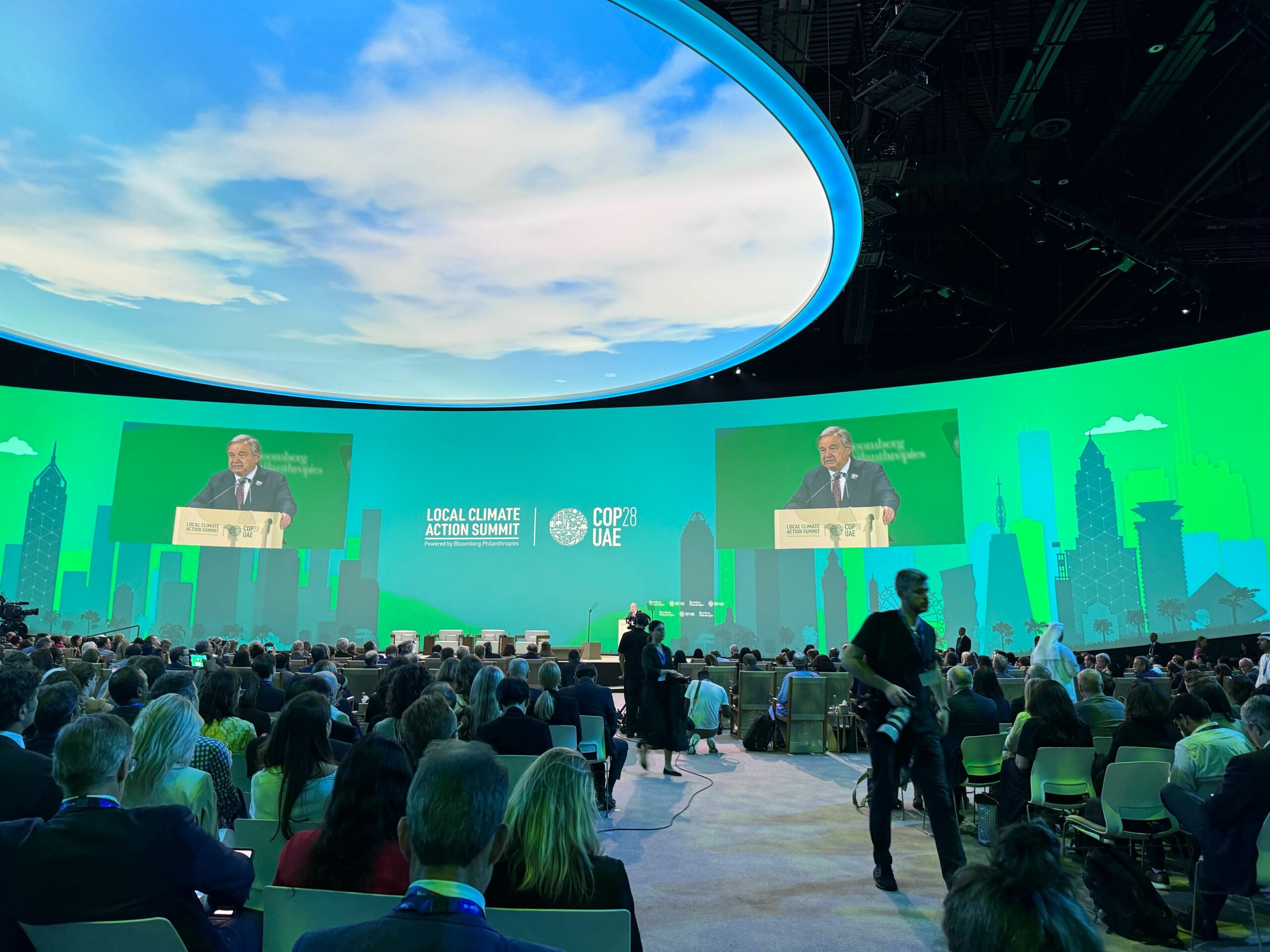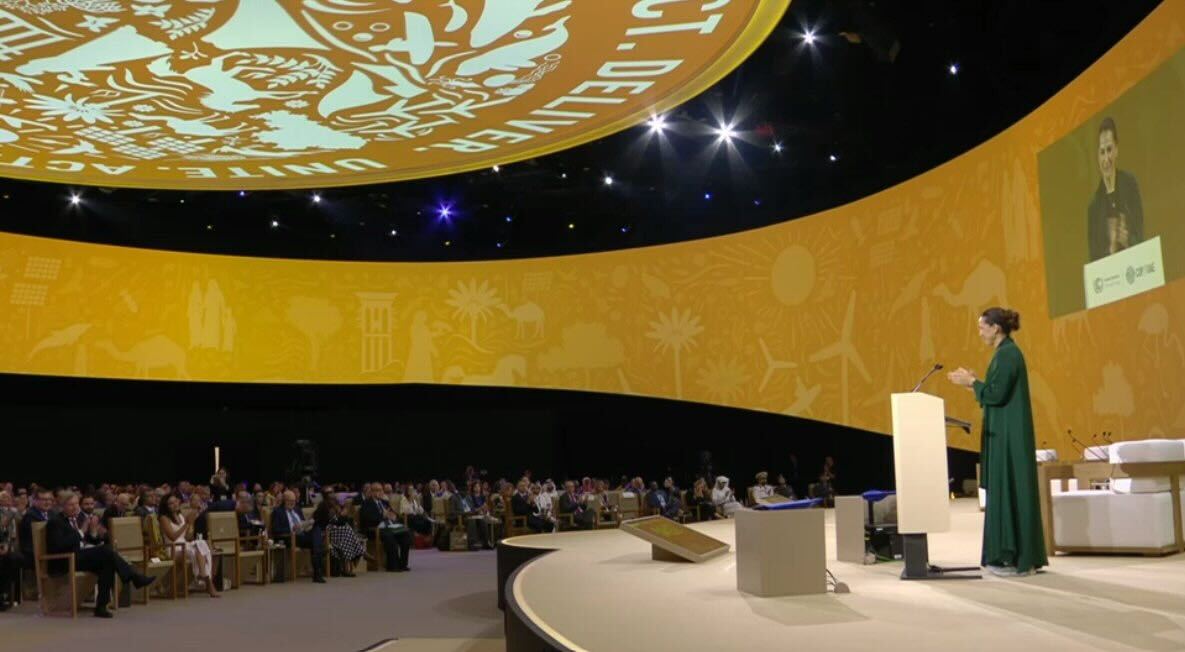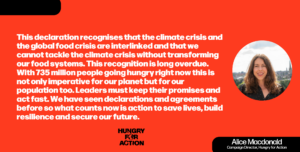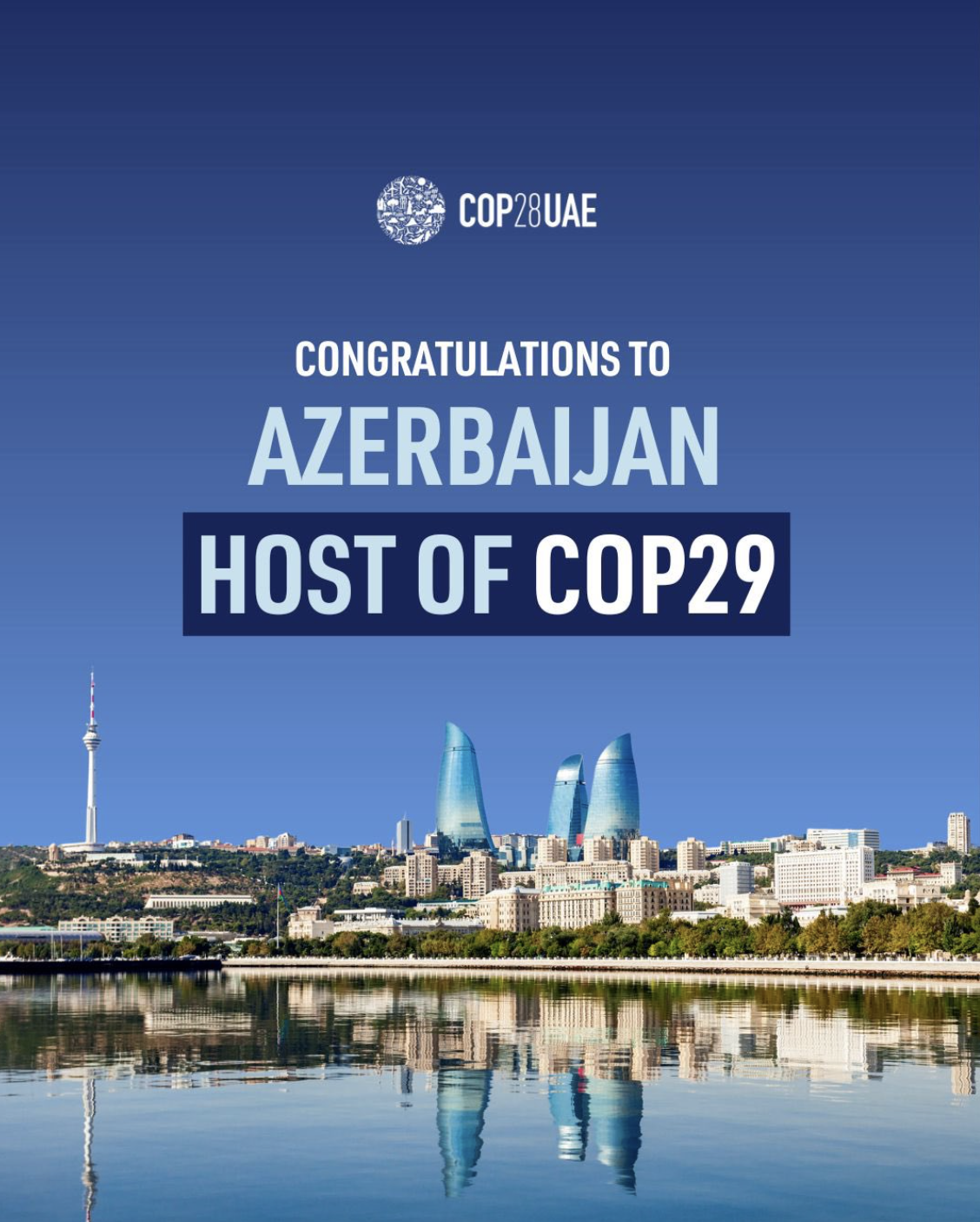The Climate Conference of parties (COP) is no longer just a global gathering of climate negotiators and climate activists and COP28 in the UAE was no different. From world leaders, to business leaders and lobbyists, civil society, Indigenous Peoples, youth and representatives of international organizations and sectors, COP28 brought together an unprecedented number and diverse group of people. Beyond its core mandate of countries sitting to agree on the best action to help mitigate the impacts of climate change on our planet, there were countless meetings and workshops of significant importance on the sidelines. The UAE as host and president helped shape much of the agenda and prioritize food in its many side events.
What we went into COP28 calling for…
As always, and with climate extremes becoming a reality in every part of the world, many came here with huge expectations. We were no different, we pegged our expectations on a four point agenda outlined in our brief 4-point Good Food For All Agenda for COP28 summarized below:
- Operationalise the Loss and Damage Fund, integrate food security and nutrition, and ensure the timely and effective flow of funds.
- Prioritise adaptation and ensure that it receives 50% of climate financing as recommended by COP26 in Glasgow.
- Step up mitigation efforts to reduce greenhouse gas emissions from food systems and halt biodiversity loss.
- Commit sufficient financing.


What happened…
The good
- Loss and Damage:
In one of those rare circumstances at this annual gathering, the Loss and Damage Fund was operationalised at the very start of COP28. As others in the room, we celebrated with a standing ovation when the COP President Al Jaber as tradition pounded his ‘hammer’ on the high table signaling the decision’s adoption. But maybe we should have waited. What we wanted was not just a fund but one that is sufficiently funded and with a clear replenishment criteria. The cost of the impact of climate change is in the billions if not trillions of dollars in loss and damage. The pledges that have come through in the 12 days since its adoption are a drop in the bucket. About $800 million has been committed to kick start the fund that aims to support the poorest and most vulnerable countries deal with the irreversible impacts of climate change. While nowhere near the needed US$290 – US$580 billion by 2030 to support developing countries address L&D, we hope and trust that through joint efforts and with a hosting mechanism (temporarily within the World Bank), more funds will flood in.
- Thanks to the UAE COP Presidency and much advocacy by many stakeholders, food was firmly on the agenda. From the Leaders’ Summit in the first days of COP28 to the last thematic day on Food, Agriculture and Water that saw over 180 side-events on December 10, including the launch of FAO’s Achieving SDG2 without breaching the 1.5C threshold: A Global Roadmap, there was much focus on the impact of climate change on smallholder farmers’ livelihoods, food security, nutrition and agriculture as well as the climate benefits and urgency of food systems transformation.
- Support for agricultural research: CGIAR secured $890 mln in funding commitments for its next replenishment cycle. This critical funding will allow the research body to expand its work in supporting smallholder farmers, building resilient, sustainable and equitable food systems, and boosting nutritious diets.
- Three important political declarations were signed:
- The Leaders’ Summit opened with 134 countries signing the COP28 UAE Declaration on Sustainable Agriculture, Resilient Food Systems and Climate Action. By the last day, 159 countries had committed to integrating food systems into their nationally determined contributions or climate plans.
- 143 countries have signed the COP28 UAE Declaration on Climate and Health, recognising the need for governments to protect communities and prepare healthcare systems to cope with climate-related health impacts.
- 13 countries, including some of the largest economies–US, France, Germany, UK and India – signed the Declaration of a Global Climate Finance Framework, calling for freeing fiscal space through debt relief, rechanneling the IMF’s Special Drawing Rights and reforming the global financial system, including the multilateral development banks, to unlock more concessional financing.

The not so good:
As has been the history of the climate negotiations, everything always comes down crashing on two crucial questions: financing and ‘departure from fossil fuels.’ So how did COP28 do?
- While the final agreement (the Global Stocktake or GST report) did not go far enough and negotiations went late into the night, by all accounts it signaled the beginning of the end of fossil fuels with language adopted in the Global Stocktake for the “transition away” from fossil fuels. This is a breakthrough. However, with no specific timetable on peak emissions and the first clear target of a 43 percent reduction in fossil fuel by 2030, it did not reflect the urgency for immediate climate action.
- Financing: across the board, funding commitments fell short of the need and it is not clear if additional funding or taken from other climate or development priorities. Live tracker of commitments here.
- Specifically on food, the GST was mixed: the adaptation section critically recognises resilient food systems as essential for climate adaptation. This is a win. However, food systems are omitted from the mitigation section – a failure to recognise food systems mitigation potential to help achieve 1.5 degrees.
- On Global Goal on Adaptation: This COP failed to provide the much needed action that would see support flow to communities worst impacted by the Climate crisis. Speaking on behalf of the Least Developed Countries (LDCs) during the COP28 closing plenary, Sierra Leone summed up this lack of action outcome:
“Adaptation needs more than just good intentions, it needs a robust framework that protects the lives, properties and livelihoods of our people and our ecosystems. Our communities deserve more than aspirational goals, they need real and impactful support to adapt to realities of climate change” – Sierra Leone Representative on behalf of LDCs
- There was also no progress on addressing the enormous adaptation financing gap. Adaptation is the means of preventing loss and damage in the future – with an estimated $6 saved in L&D for every $1 spent on adaptation – yet the high-income countries kicked the can down the road.
- There were high profile events on food, however, negotiations on the Sharm el-Sheikh Joint Work on Implementation on Agriculture and Food Security (SSJW) – the programme of work for the implementation of climate action on agriculture and food security – concluded without agreement. This delays work until June 2024.

What comes next…
The next COP–COP29 will be held in Baku, Azerbaijan in November 2024. The following year, COP30 will be hosted by Brazil. This year’s COP was a step change in aligning the climate and SDG2 agendas. The next year or two will be crucial in consolidating that understanding and related commitments. Advocates and stakeholders on food and climate must continue to engage negotiators to deepen their understanding of the urgency to ensure that the actions they take are good for people and the planet.
Countries must now focus on shaping new national climate commitments and updating their NDCs – to move away from fossil fuel and set ambitious targets on food in line with the Food Declaration. It will also be important to focus on accountability by all stakeholders to deliver on the commitments made and leave no one behind.
Moving forward, financing for climate action for mitigation, adaptation and loss and damage and to achieve the Sustainable Development Goals remains wholly inadequate. It will be critical, with the 7 years left to 2030 and to stay within the 1.5 degree Celsius threshold, to step up actions that yield multiple benefits for people and for the planet. Food systems transformation holds the key to reaching the most vulnerable people, improving nutrition and health, livelihoods and feeding a growing population sustainably and equitably–leaving no one behind.
2024 offers several opportunities for the international community to come together to deliver the urgently needed financing. Italy and Brazil hold the presidencies of the G7 and G20 Summits – both have put food and climate high on their agendas. The World Bank will continue to be at the heart of financing discussions. MDB reform efforts are ongoing, with the implementation of the Evolution Roadmap and the IDA 21 Replenishment process will be crucial to delivering the concessional financing low and lower-middle income countries desperately need. Unsustainable debt continues to hinder development and climate action and debt relief is moving far too slowly. Expanding the fiscal space for low-income countries must be a top priority going into the new year.







